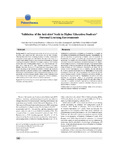Validation of the Activities’ Scale in Higher Education Students’ Personal Learning Environments

Use this link to cite
http://hdl.handle.net/2183/28251Collections
- Investigación (FEDU) [939]
Metadata
Show full item recordTitle
Validation of the Activities’ Scale in Higher Education Students’ Personal Learning EnvironmentsAlternative Title(s)
Validación de la Escala de Actividades en los Entornos Personales de Aprendizaje de Estudiantes de Educación SuperiorDate
2021Citation
García Martínez, J. A., González Sanmamed, M., & Muñoz Carril, P. C. (2021). Validation of the Activities’ Scale in Higher Education Students’ Personal Learning Environments. Psicothema. doi: 10.7334/psicothema2020.259
Abstract
[Abstract] Background: Personal learning environments are the networks of tools, activities, and connections that each person uses for their learning. Although there have been increasing numbers of studies, measurement instruments in this regard are still limited. The aim of this study is to construct and validate a scale to assess the activities that make up Personal Learning Environments. Method: The sample comprised 1,187 students in their final year of undergraduate degrees. 64% were women and 36% men, with a mean age of 24 and a standard deviation of 4.21 years. Results: the scale consists of 27 Likert-type items responding to three factors according to the theoretical construct reviewed, and produced high coefficients in internal consistency tests. Conclusions: the analyses demonstrate a valid instrument with solid psychometric properties. More specifically, the results indicate suitable content validity. Exploratory and confirmatory factor analyses indicate appropriate construct validation, with consistency between the theoretical and factorial model. [Resumen] Antecedentes: los entornos personales de aprendizaje se definen como el entramado de herramientas, actividades y conexiones que cada persona utiliza para su aprendizaje. Los estudios sobre el tema han ido en aumento, sin embargo, son todavía escasos los instrumentos de medición al respecto. El objetivo de este trabajo es construir y validar una escala para evaluar las actividades que integran los Entornos Personales de Aprendizaje. Método: la muestra estaba formada por 1.187 estudiantes universitarios de último año de carrera. Un 64% eran mujeres y un 36% hombres, con una edad media de 24 años y una desviación típica de 4.21. Resultados: la escala queda formada por 27 ítems tipo Likert respondiendo a tres factores de acuerdo con el constructo teórico revisado, obteniendo coeficientes elevados en las pruebas de consistencia interna. Conclusiones: los análisis realizados muestran un instrumento válido y con propiedades psicométricas sólidas. Concretamente, los resultados arrojan una adecuada validez de contenido. Los análisis factoriales exploratorio y confirmatorio indican una pertinente validación de constructo, existiendo coherencia entre el modelo teórico y factorial.
Keywords
Personal learning environment
Questionnaire validation
Higher education
University students
Entorno personal de aprendizaje
Validación de cuestionario
Educación superior
Estudiantes universitarios
Questionnaire validation
Higher education
University students
Entorno personal de aprendizaje
Validación de cuestionario
Educación superior
Estudiantes universitarios
Editor version
Rights
Los derechos de impresión y de reproducción por cualquier forma y medio son de la revista Psicothema, que no rechazará cualquier petición razonable por parte de los autores para obtener el permiso de reproducción de sus contribuciones.





